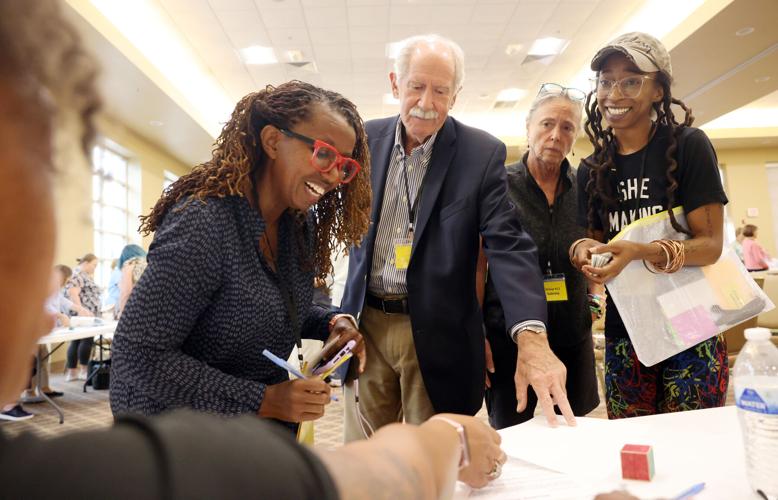Picture having to decide whether to pay rent or put food on the table. Think about what itãs like to navigate a city when you donãt speak the language or to finish a late-night shift with no car or running public transit.
House of Bread asked the ôÕѿǨû§¿ìë½ community to not only imagine the challenges of poverty but to step into someone elseãs shoes during a simulation Wednesday exploring the barriers many people face while trying to create a stable life.

Kanini Susan Wilhelm, from left, Jim Ellison, Lisa Goad and Desirae Dillon seek out better housing during a poverty simulation offered by the nonprofit House of Bread at St. Johnãs Episcopal Church on Wednesday.
House of Bread mentors women who were formerly incarcerated. The nonprofit helps strengthen women through training in the baking and food services. But another underlying goal is to build relationships with the underserved community and to bring down barriers that hold them back.
ãWe are going to change ôÕѿǨû§¿ìë½ so that ôÕѿǨû§¿ìë½ is a much friendlier city for anybody to thrive,ã said Jen Brothers, co-founder of House of Bread.
People are also reading…
ãThat piece means itãs going to take all of us to shift, all of us to change our minds to try and remove the barriers for anybody thatãs trying to rebuild their life.ã

During the House of Bread ãUnderstanding Povertyã simulation on Wednesday, attendees were put into groups and took on the life of fictional characters whose stories were rooted in real experiences of people struggling with poverty.
The event aimed to shed light on the complex struggles people face in poverty while dealing with trauma, language barriers, and limited access to transportation, housing or livable wages.
While the characters in the simulation were fictional, their stories were rooted in real experiences of women who trained with House of Bread. Groups of people stepped into the shoes of one person experiencing their life by navigating the bus stop, trying to find a job or a better paying job, getting evicted, going to the shelter, picking kids up from daycare and going to get groceries.
One such story was a chemist from El Salvador, who came to the U.S. seeking a better future for her family. She slept on the couch, with no car, limited English, and relying on a bus system that didnãt operate during the hours she worked.

Sheriff Antonio Hash volunteered and spoke during the House of Bread ãUnderstanding Povertyã simulation on Wednesday at St. Johnãs Episcopal Church.
For many attendees, the simulation was an eye-opening look into the day-to-day grind of women working tirelessly just to surviveãespecially those facing the dual pressure of providing for their families while navigating systemic barriers.
ãI felt defeated at one point, like completely defeated, stressed, lost and confused,ã said Desirae Dillon, a simulation participant.
Organizers hope the experience encourages deeper compassion and less judgment toward those experiencing poverty. House of Bread is currently conducting a fundraiser and is always seeing donations to help keep their bakery training classes going.

Participants gather to talk about their experiences and what they learned during the House of Bread ãUnderstanding Povertyã simulation at St. Johnãs Episcopal Church on Wednesday.
Dillon, who is 35 and lives in ôÕѿǨû§¿ìë½, said she has pulled herself out of poverty and has volunteered with House of Bread.
ãI think we all need to be open to everyoneãs journey and that, you know, tables turn quickly,ã Dillon said. You never know if youãre going to be in somebody elseãs shoes. So, just try not to have judgment towards anybodyãs situation, because you never know when itãs going to be yours.ã

















